Eclectic Society
|
18th century |
20th century |
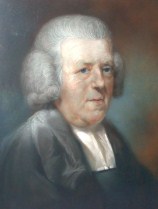 |
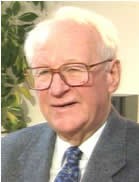 |
|
founded by John Newton in 1783 |
founded by John Stott in 1956 |
Bishop Timothy Dudley Smith
a founder member of
John Stott's
Eclectic Society |
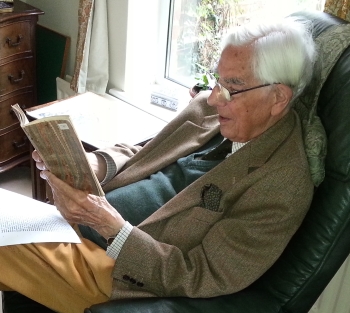 |
reading
John Newton's
Eclectic Society manuscript notes
for 1789 - 1795
|
"In this Introduction to the Eclectic Society,
we are reminded – as Newton would have wished –
that behind their intellectual enquiries and practical planning
lay a deep spiritual fellowship
of mutual education and encouragement;
and we are reminded that this is
of much more than historical interest,
as evidenced
by John Stott's 'revival' of a new Eclectic Society
in the mid-1950s."*
Timothy Dudley Smith
May 2015
|
* for details of John Stott's Eclectic Society, see Timothy Dudley Smith's biographies:
John Stott, The Making of a Leader, 1999, pp 305-8, and John Stott, A Global Ministry, 2001, e.g. pp 82-3, 151-2
|
Introduction
Founder Members:
 |
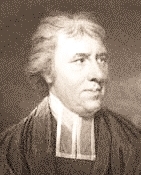 |
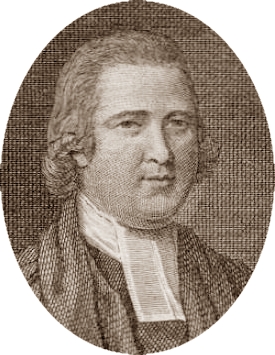 |
[no image] |
John Newton
1725 - 1807 |
Richard Cecil
1748 - 1810 |
Henry Foster
1745 - 1844 |
Eli Bates
c. 1744 - 1812 |
Finding advantages in Christian fellowship
|
|
|
|
|
It is fairly well known that John Newton founded the Eclectic Society in 1783, with foundation members Richard Cecil, Henry Foster and Eli Bates. [1]
However, it was not the first such society which Newton had founded. We might well say it was the third 'eclectic' society he had founded, and the fourth of which he was a member.
|
|
Jump to: |
|
|
|
|
Following the advice of Captain Alexander Clunie (a member of Stepney Independent), [2] Newton used every opportunity to augment his newly-grounded faith by seeking out faithful teaching, and meeting for fellowship with an interdenominational society of believers in London.

On Monday 3 February 1755, at 7pm, and on Monday 17 March 1755, Newton attended "the society meeting at Mr May's". William May [3] was assistant minister at the Presbyterian chapel in Great Ayliffe Street, Goodman's Fields, and joint pastor at Pinner's Hall.

Newton continued to attend these society meetings whenever he could get to London. For instance on 14 April 1755, hearing the testimonies of several present, he was encouraged to find that "I am not alone in my complaints of indwelling sin, and hardness of heart." He was at the society again on 21 April 1755, "where I was called upon to pray, and had an opportuntity of speaking two or three times, upon cases that offered."
The Biblical and prayerful discussions at these society meetings were such an encouragement to him, and such a spur to his spiritual growth, that he resolved to do all he could to form and frequent similar societies wherever he went.
|
|
|
|
Newton's diary, Saturday 15 February 1755 |
 |
|
"My acquaintance with Clunie, was greatly blessed to me in this point, [4] and since by his means I have been brought to converse with many more excellent Christians, who have been I hope of great use to me, and from a knowledge of my circumstances have been led to glorify God on my behalf. It is my judgement that societies formed on this view, will by divine blessing be abundantly useful, in promoting a spiritual and vital Godliness. I pray that I may always see it my duty to attempt the forming of such, or frequenting them when I have opportunity so to do." |
|
Saturday 22 March 1755 |
 |
|
"I hope though that I may praise God for an increase in knowledge and graces this year: my friendship with Captain Clunie and the acquaintance I have by his means made with several judicious Christians, has by divine grace been of great advantage to me, both in giving me clearer notions of some gospel truths, and some encouraging examples for practice." |
|
|
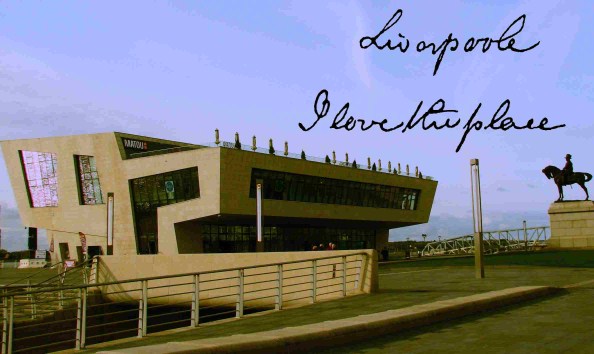 |
On moving to Liverpool to assume his new post of Surveyor of the Tides, Newton sorely missed the fellowship of his Christian friends in London.
Scarcely a month after his arrival up north, he began thinking of how to form a similar interdenominational fellowship group: |
|
Tuesday 30 September 1755
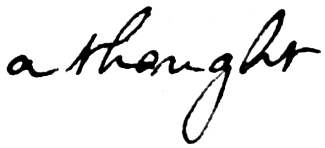
“Rose at 4, went to the Watch House, engaged in prayer, reading, etc, till past 6, then took a walk to plan and to pray over a thought which has been several times in my mind but particularly today, to endeavour to set on foot a religious society in this place.
|
 |
|
The Lord direct my heart and tongue and pen for the glory of his name.” |
|
In January 1756, having previously made do in lodgings, the Newtons finally found a home they could call their own. This gave him space to set aside a study, and he was soon “employed in writing about the plan of a society”.
On Tuesday 2 March he “began to copy for the press, some thoughts I have drawn up with regard to religious society”.
|
|
|
|
Friday 9 April 1756 |
 “Finished my essay and sent it to the press. I have now to guard against two evils that are opposite, which yet it is likely will join to disturb me: pride and shame. “Finished my essay and sent it to the press. I have now to guard against two evils that are opposite, which yet it is likely will join to disturb me: pride and shame.
It should seemed there is but little to be proud of, but I expect the approbation of some good people may be a temptation – on the other hand I am exposed not only to the censure of the critics with respect to the style etc, but to the blame of the zealots of all parties: to be thought an angry Enthusiast by some, and a lukewarm temporiser by others. I trust the Lord will be my defence against both the right and the left hand danger. Let me now remember that I have given bond, as it were, to the public for my behaviour. I have declared my hopes and principles in print, and shall consequently have more eyes upon my conduct than ever.
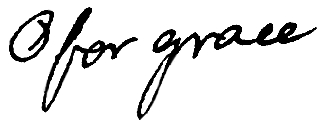 O for grace so to walk as I may give occasion to none to blaspheme the gospel cause on my account, but rather, that beholding the uprightness and consistence of my life in all its parts, they may be constrained to glorify God on my behalf. O for grace so to walk as I may give occasion to none to blaspheme the gospel cause on my account, but rather, that beholding the uprightness and consistence of my life in all its parts, they may be constrained to glorify God on my behalf.
And do thou Lord if it please thee, smile upon my poor attempt; make it a means of establishing a society of those who fear thy name — at least of stirring up someone more worthy and more skilful to take the design in hand.” |
"O for grace
so to walk
as I may give occasion
to none to blaspheme
the gospel cause
on my account
but rather,
...they may be constrained
to glorify God
on my behalf."
|
|

|
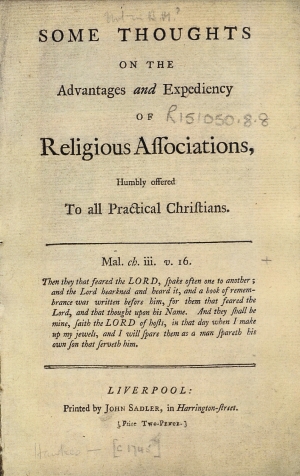
|
Newton’s 'essay' [5] was entitled: |
|
Some Thoughts on the Advantages and Expediency of Religious Associations,
Humbly offered To all Practical Christians
|
He began: [see here for a full transcript]
"Amidst the many peculiar customs and practices which distinguish the Inhabitants of this land of Liberty from most other nations, the prevalence of clubs, societies and associations, is not the least remarkable..."
Comparing the times in Malachi to those in Great Britain in 1755/6, under an imminent threat of war, Newton argued that believers ought also to be meeting together:
"Should not we therefore be glad to discourse of the nature and circumstances of our journey; of the difficulties we do or may meet with, and the accommodations we receive or stand in need of on our way?" |
|
The cover page of this publication quotes Malachi 3:16,17, reflecting Newton's above prayer in his diary entry for 9 April 1756, for establishing a society of:
Then they that feared the Lord, spake often one to another: and the Lord hearkened, and heard it,
and a book of remembrance was written before him, for them that feared the Lord, and that thought upon his name.
And they shall be mine, saith the Lord of hosts, in that day when I make up my jewels;
and I will spare them as a man spareth his own son that serveth him.
|
|
Friday 16 April 1756 |
 “Wrote to Mr Whitefield, Brewer and Hayward; “Wrote to Mr Whitefield, Brewer and Hayward;
sent the two latter one of my Thoughts on Religious Associations which came out of the press today.”
The following day Newton continued circulating copies of his papers, and “ordered one to be sent to every Reverend Gentleman in town”. His diary entry for that day closed with:
“Mem[o]: to make it a part of my daily prayers, that the Lord would be pleased to own this my poor desire; or that he would find some abler hands to work by...” |
|
|
Moving on from Liverpool nine years later to Olney, to become curate-in-charge of the parish church of St Peter & St Paul, Newton had scarecly been ordained a week when he began urging local evangelical clergy to meet together in a similar fellowship group.
Saturday 23 June 1764 |
|
Thomas Haweis
|
“Yesterday Mr Haweis [6] came to see me, and went away today.
I hope it was a refreshing interview."
 |
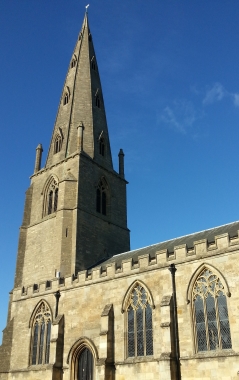 St Peter & St Paul
St Peter & St Paul
|
|
We have talked over the means of forming an association of Gospel clergy in this neighbourhood, and have appointed the first Thursday in August to be our first meeting [7], and Olney the place, if[of] which Mr Berridge [8], Hicks [9], Maddock [10], Richards [11], Clarke [12] are to be informed. May the Lord dispose us to mutual love and union, bring us together and crown our meetings with his presence.” |
|
|
It was therefore very natural, when Newton moved to London sixteen years later as rector of St Mary Woolnoth, for him to want to form a fellowship group of interdenominational clergy and laymen with the same objectives in mind to those which had so inspired him almost 50 years earlier in that same city where he had first tasted “the Advantages and Expediency of Religious Associations”.
St Mary Woolnoth
|
|
Glimpses into Newton’s London Ministry
Despite a slow start amongst the resident parishioners, the church was soon full to the brim with visitors coming from all over the metropolis to hear Newton’s teaching. At a later Eclectic Society meeting, discussing what constitutes 'effect' in preaching, Newton responded: “Effect, I believe, has been produced in my preaching by a solemn determination to bring forth Jesus Christ as the GREAT SUBJECT in all my discourses. I try, moreover, to leave this impression on the people – that I wish them well.” [13] |

Josiah Pratt's Eclectic Society notes for 5 Mar 1798 |
|
The Eclectic Society notes, published in 1856 by Josiah's son John Henry, used a little editing licence in the trancsripts: |
|
Josiah's above ms notes (abbreviations in full) |
John Henry's edited transcript: |
Effect produced in my preaching by a solemn determination to bring forth Jesus Christ as the great subject in all my discourses.
I try to leave this impression on the people – that I wish them well.
The length of a preacher his measure in the pulpit – his breadth his conduct and character.
Man may be very long, but a mere talk[?]. He may be short, but well set.
Are [ane?]General always fighting in his journeys – great part of a Christian’s study. Read creation – read mankind etc.
Agree with Pratt that no general rule for all.
Some are the eye – Owen.
Some a warmth, fluency.
Two grand arguments:
1. "I beseech you by the mercies etc"
2. "I warn you by the terrors etc"
Two sorts of popularity for a minister:
1. Exertion of talents
2. Reaching the heart
Flies from those who seek it. |
Effect, I believe, has been produced in my preaching by a solemn determination to bring forth JESUS CHRIST as the GREAT SUBJECT in all my discourses.
I try, moreover, to leave this impression on the people – that I wish them well.
The length and breadth of a preacher may be thus represented.
His length is his measure in the pulpit; his breadth, his conduct and character out of it. A man may be very long, but a mere talker.
He may be short, but well set.
I agree with the last speaker but one, that no general rule can be laid down for all.
There are two grand arguments which we must constantly put forth:
(1.) I beseech you by the mercies of God. [Rom 12:1]
(2.) I warn you by the terrors of the Lord. [2 Cor 5:11]
There are two sorts of popularity which ministers attain to —
One from the exertion of talents; the other by reaching the heart. |
Utopia
When Newton founded the Eclectic Society, he was already a member of another London society, which he called the 'Utopian Society' – a group formed to establish the basis for an academy for training young men for the Ministry. [14] It was most unusual for a Church of England Minister (who had never been to university) to have been asked to plan the curriculum for an Independent College, but the combination of Newton's Biblically grounded intellectual and pastoral skills had made him the obvious choice for his dissenting friends to approach. Newton had thought that once he had devised their curriculum, his responsibilities would be over. However, just as he was leaving, he found himself “hooked in” to further meetings through a surprise and unanimous re-election by the committee. |
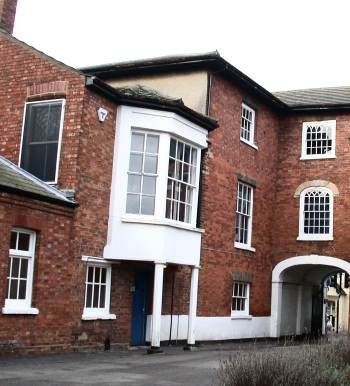
Newport Pagnell Academy |
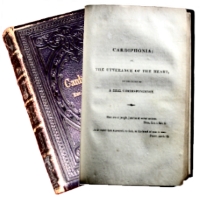 Increasing influence Increasing influence
A particularly notable event in Newton’s life at this time was the publication in 1782 of Cardiphonia — letters written privately to friends, but recalled (with their permission) for publication. The two volumes received wide acclaim. Indeed, the practical and Scriptural wisdom in this correspondence is still found useful to many today, especially those studying for any form of ministry.
Cardiphonia
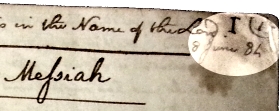 Soon to come would be his series of 50 sermons preached from every text in Handel’s Messiah, which he began preaching on in June 1784, immediately after the grand commemoration of Handel in 1784. Soon to come would be his series of 50 sermons preached from every text in Handel’s Messiah, which he began preaching on in June 1784, immediately after the grand commemoration of Handel in 1784. |
|
This would be followed in 1785 by a secret meeting with William Wilberforce, when Newton’s advice to him then, and his constant support for him thereafter, would see the stage being set for major changes in national morals and policies. |
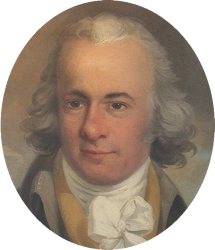 |
 "...you will be a welcome guest. "...you will be a welcome guest.
"Great subjects to discuss, great plans to promote, great prospects to contemplate, will always be at hand.
"Thus employed, our hours, when we meet, will pass away like minutes."
Newton to Wilberforce 21 March 1786
IBodleian Library, Oxford University 2015, MS Wilberforce c.49, f4] |
|
|
|
Amidst this ever widening ministry, came the foundation of the Eclectic Society. ‘Eclectic’ is defined by the OUD as ‘Deriving ideas, style, or taste from a broad and diverse range of sources’. The ‘Eclectic Society’ was a very appropriate title for members chosen from a diverse range of believers. |
|
Initially there were just 4 members of the society: Richard Cecil, Henry Foster, Eli Bates and John Newton. Their first meeting was held on 16 January 1783. |
|
The first question they considered was proposed by Newton, who, according to the rules they established, therefore kick-started the discussion on: |
|
“What is the proper idea of growth in grace; and what are the best evidences of such growth, both in ourselves and others?” |
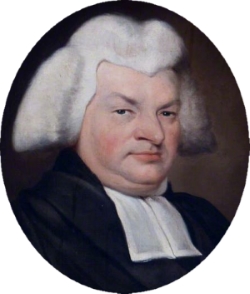
 |
In a letter to his friend William Bull, [16] Newton identified some of the ‘eclectic’ benefits of drawing in new members from laymen and ministers outside the Church of England: “We are one as to essentials, and our smaller differences of sentiment are such as only conduce to give the conversation a more agreeable variety, and tend to illustrate our subjects to greater advantage.” [17] |
Meetings were initially held on alternate Mondays at the Castle & Falcon, Aldersgate — a coaching inn owned by Matthew Dupont, who was a member of Spa Fields Chapel. [18]
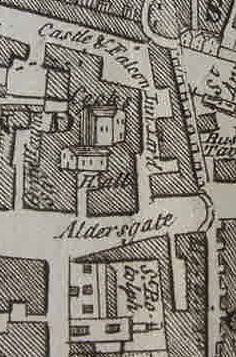 The Castle & Falcon was on the east side of Aldersgate, No. 5, almost opposite St Botoph's, close to the former site of the Cooks' Livery Company and near the Moravian chapel where the Wesleys had been converted. Coaches departed almost daily from the Inn for the Midlands and the North of England.
The Castle and Falcon, Aldersgate Street The Castle & Falcon was on the east side of Aldersgate, No. 5, almost opposite St Botoph's, close to the former site of the Cooks' Livery Company and near the Moravian chapel where the Wesleys had been converted. Coaches departed almost daily from the Inn for the Midlands and the North of England.
The Castle and Falcon, Aldersgate Street
by George Scharf, 1827
|
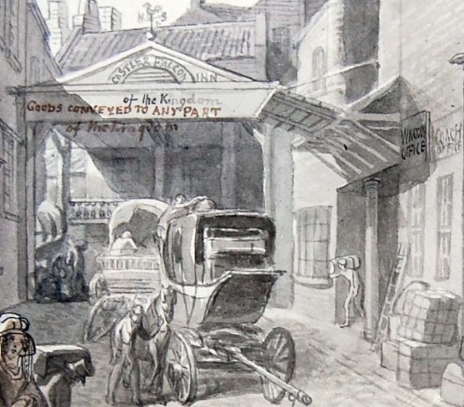 |

“Mr & Mrs Dupont, who keep the Castle & Falcon in Aldersgate Street
are very serious people and their house is as regular as a private family." |

They are likewise my friends.” |
The meetings began at 4.15pm, in true British tradition, with tea. The chairman opened with his thoughts on that session's question. He was followed by each member, contributing in their turn. The question for the next fortnight’s meeting was agreed. Whoever had proposed it was appointed to lead their future discussion.
The teapot opposite is engraved: |
|
|
"Bequeathed to the Eclectic Society by John Bacon Esqre, late one of its Members, as a token of his affectionate regard" |
|
The policy of proposing the next question a fortnight in advance may perhaps reflect a lesson which Newton had learned three decades earlier in Liverpool: |
|
“In the evening at the conference, subject was Micah 6:8, but it proved almost a warm[heated] debate, through different understanding [of] the terms, and whilst each one was warm to support their own opinion, we lost the improvement of the spiritual meaning which we all acknowledged. In some measure to prevent this, and to cut off mistakes which persons may slip into for want of time to consider a text, I proposed that a verse should be given out every evening at parting, as a subject for the next week, which was agreed to, and Mr Oulton gave us Colossians 3:1 to begin with.”
Diary, 7 April 1756
|
 |
Membership was by invitation only. The initial membership of four was gradually extended to an approved maximum of 9 during the first year. A proposal of a new member had to be agreed upon unanimously, otherwise that suggestion was put aside for a year before becoming eligible for reconsideration.
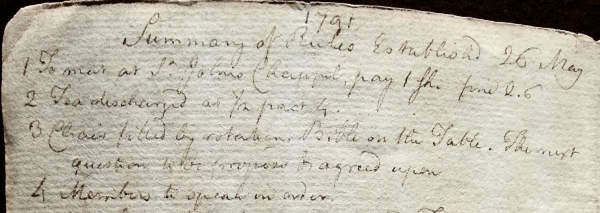 By the time the Rules of 1791 (listed in these notes) were operating, the maximum membership had been raised to 13. By the time the Rules of 1791 (listed in these notes) were operating, the maximum membership had been raised to 13.
The Rules outlined conditions for country visitors and for missionaries. To preserve a discussion group small enough for everyone to voice their opinion, no visitors were permitted who lived within five miles of the city. |
|
|
|
|
Newton in letters to William Bull: |
|
28 February 1783
“Our new institution at the Castle and Falcon promises well. We are now six members, and voted in a seventh last night. [19] We begin with tea; then a short prayer introduces a conversation for about three hours upon a proposed subject, and we seldom flag. Mr Bates usually sits silent the first half hour, and perhaps takes the second to himself in a continued discourse. The light he throws upon the subject, and the precision with which he treats it, are admirable; and so are his humility and ingenuousness. You can form no right judgment of him from the metaphysical dispute between him and Mr Isaac Milner. [20] He is indeed a main pillar in the society, and I hope those meetings will prove a benefit to us all. I think they are the most interesting and instructive conversations I ever had a share in. Perhaps it may gratify your curiosity to be told the points we have hitherto discussed. Take them as follows: — |
|
|
1st Meeting |
[16 Jan 1783] |
What is the proper idea of growth in grace; and what are the best evidences of such growth, both in ourselves and others? Proposed by JN. |
|
2nd Meeting |
[30 Jan 1783] |
To what is owing the different reception of the gospel amongst professors, so that in some it thrives, and in others seems to produce no good fruit? Proposed by Mr Foster. |
|
3rd Meeting |
[13 Feb 1783] |
Is the decalogue a compact summary of the law of God to man? Or, how far had it a peculiar respect to the state of the Israelites at that time? Proposed by JN. |
|
4th Meeting |
[27 Feb 1783] |
How far is it the duty of a Minister to accommodate himself to the weakness, the taste, or the prejudices of his hearers? |
|
[5th Meeting] |
[13 Mar 1783] |
The subject for the next meeting is to be, What influence has natural temper and constitution upon religion? |
Thus far for the history of our Royal Society, which, perhaps, deserves that name more than that which meets at Somerset House; [21] as, with us, I trust the members are all of the royal family, and the King himself condescends to meet with us.” |
|
|
On 25 April 1783: [22] |
|
|
“I am sometimes almost weary and ashamed either to write or preach any more, there is such a vast difference between what I am in myself, and the idea the Lord has given me of what a believing sinner ought to be. Our conversations at the Castle and Falcon, which are still carried on once a fortnight, are suited to lead me deeper into the study of human nature and of my own, than is perhaps very common even among good people. I find, upon consideration, that the appearances of grace are in general far beyond the reality; and that when proper abatements are made for constitution, association, imitation, situation, and other circumstantials, what remains that is truly genuine and sterling would be but like a few grains of gold extracted from a heap of ore and rubbish. Or rather we are a made metal, of a golden colour, and some gold in the constitution, but not much. With regard to what we call experience, the adage will hold, Non omne quod micat aurum est.” [23] |
|
|
On 31 October 1783 |
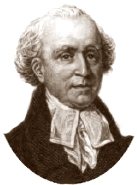
Mr Clayton [24] |
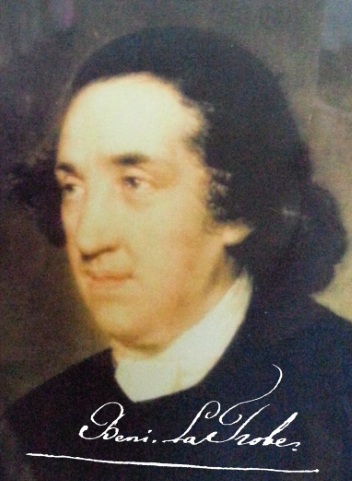
and Mr Latrobe [25] |
|
“I believe our Eclectic Society has been increased since I mentioned it last, by the addition of two members whom we value greatly— |
|
Our number is now eight: we can admit but one more, and shall therefore endeavour to be very careful whom we choose. We think the Lord has favoured us; we are all unanimous and pleased with each other. We are one as to essentials, and our smaller differences of sentiment are such as only conduce to give the conversation a more agreeable variety, and tend to illustrate our subjects to greater advantage. The spirit of the design is kept up, and every member seems to find it well worth his while to attend punctually. I hope I find some real advantage, and have reason to number it among my chief privileges. Help us with your prayers, that life and love, peace and truth, may flourish amongst us.” |
|
Benjamin LaTrobe informed fellow Moravian Henry [XXVIII] Reuss of some interesting details on how his membership came about: [26] |

The Revd Mr Cecil a clergyman who preaches with blessing brought me a message from a society not long formed. The Rules of which is that they will converse about the work of our Lord simply and freely; |
 |

they have formed Rules, one of which is that their number shall be confined to nine, that they will admit no member but by unanimous votes, that so they may be free and hearty, and added that they now consist of the Revd Messrs Newton, Foster, Abdy, Cecil, another clergyman (whose name I cannot now recollect) [Clayton] and Mr Bacon and Mr Bates; they have unanimously voted and elected me a member if I will accept of it. They are all learned and indeed worthy men. |
 |

I begged time to think of it, and asked whether I could not be admitted as a guest. Mr Cecil or Newton said they had a Rule to allow no clergyman dwelling in town as a guest, but they believed that they would make in this case an exception. I have spoken with our EConfce [Elders’ Conference] and they are all for it; as they esteemed the members of it. |
 |

We shall see how it will be. |
|
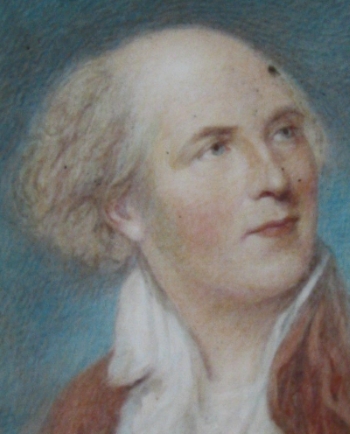
John Bacon RA |
John Bacon gives us a litle further insight into Newton's comments in his own Eclectic Society notes: |
|
20 May 1793
Question: What will justify the refusal of a pulpit?
Newton: We should know that the man's turn and manner suits our people – sometimes a man preaches to believers as though they were all pickpockets. |

John Bacon's manuscript notes |
|
|
In 1955, John Stott wrote to twenty-two friends in the London area, beginning:
“I expect you remember how John Newton and Richard Cecil in the year 1783 founded ‘the Eclectic Society’… We have for some time had it in our minds and on our hearts to do, on a tiny scale, the same kind of thing. We’d love you to join us…” [27]
Stott’s ‘tiny scale’ of meetings was to have a major impact on the Church of England. |
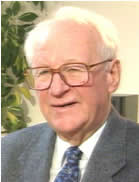
John Stott |
Timothy Dudley-Smith describes this:
“Quite the most important effect of the revival of the Eclectic Society in this century was the self-education and mutual support it offered to its members. It raised the sights, and the morale, of a generation of evangelical clergy. It offered a new perception of what might be achieved for the Church of England, of the role of expository preaching, and of the handling of Scripture. Much that was innovative in that fertile period drew at least some of its inspiration from the Eclectic fellowship…”
These innovations included the Family Service movement, the Youth Praise songbooks, Psalm Praise, David Sheppard’s inner-city initiatives, the Frontier Youth Trust, Tear Fund and the National Evangelical Anglican Congress of 1967. [28] |
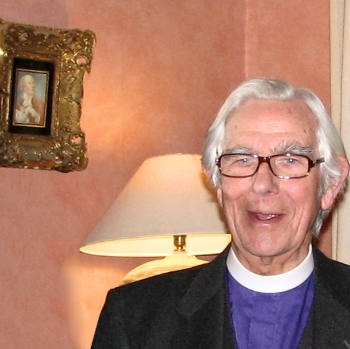
Timothy Dudley Smith and John Bacon |
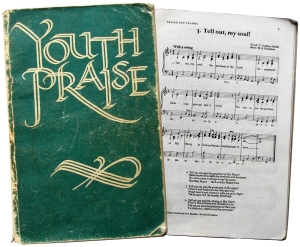 |
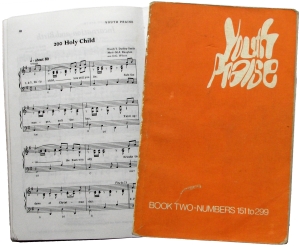 |
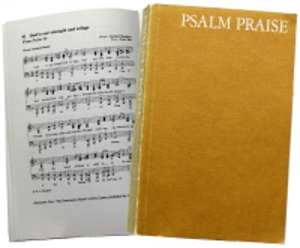 |
|
Youth Praise 1 |
Youth Praise 2 |
Psalm Praise |
|
May the presentation of these Eclectic Society notes by John Newton inspire similar spiritual growth and impact. |
|
|
|
The earliest available notebook by Newton (or by anyone else) is for 1787-1789. See here. |
|
The manuscript notes, transcribed in the following section, headed:
Eclectics
6th July 1789
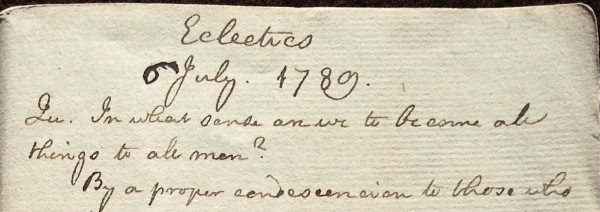
|
|
comprise dated Questions followed by the ‘answers’. A second Eclectic Society notebook of Newton’s (1787-1789) identifies points made by each person present. However, the above 1789-1795 notebook has only one entry following each question. [29] From a comparison with John Bacon's meeting notes, it would appear that Newton's notebook entries are a combination of his own opinion and other people’s expressed during their discussions, which he wrote up later at home.
Spelling and punctuation have been normalised, within the context of abbreviated notes.
|
|
Josiah Pratt
|
The Eclectic Society notes of a later member, Josiah Pratt, [30] Newton’s curate, were published in 1856 as Eclectic Notes, in edited transcripts done by Pratt's son John Henry. [31]
Josiah Pratt’s notes commence in the year 1798, which is later than either of Newton’s two extant notebooks.
They include some of the last comments of Newton's at the Eclectic Society. His final recorded attendance, according to Pratt's publication, was on Monday 21 May 1804. |
Henry Foster had posed the question: "By what arguments shall we plead with God to deliver us from the French?" Newton responded in a forthright manner:
"Considering our advantages, we are worse than any nation under the sun."
Pratt's last recorded comment by Newton at the Eclectic Society, 21 May 1804
|
|
|
|
( as recorded in Josiah Pratt's Eclectic Society notebooks )
|
1798
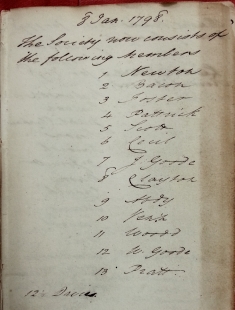 |
1799
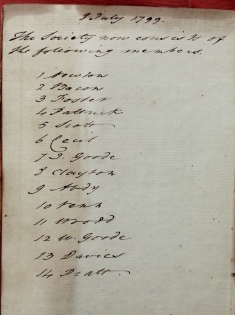 |
[Oct] 1800
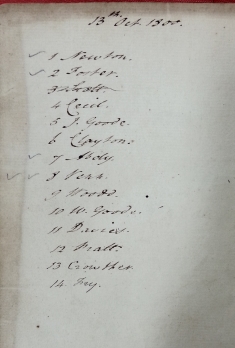 |
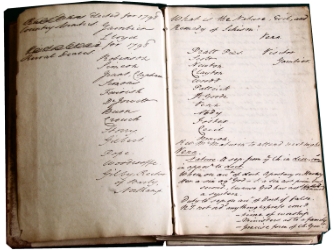
Josiah Pratt's
Eclectic Society notes
[1798 - 1814]
|
Members: Newton, Bacon, Foster, Pattrick, Scott, Cecil, J Goode, Clayton, Abdy, Venn, Woodd, W Goode, Pratt
& Davies |
[as for 1798] |
[Bacon had died, Scott had moved, Crowther and Fry had joined] |
|
1801
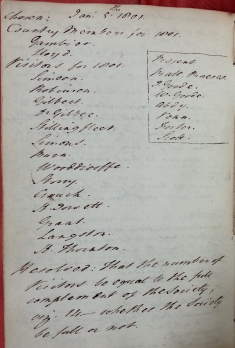 |
1802
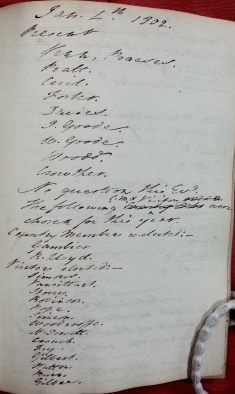 |
1803
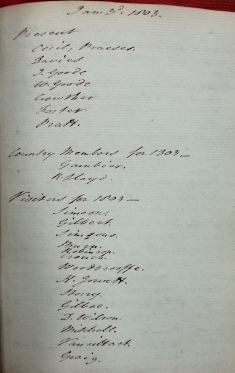 |
1804
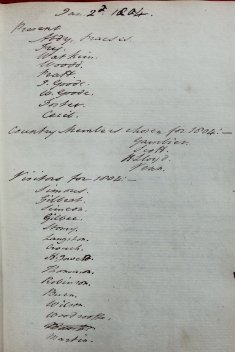 |
|
[14 members]
Country Members:
Gambier, Lloyd
Visitors:
Simeon, Robinson, Gilbert, Gilbee, Stillingfleet, Simons, Burn, Woodrooffe, Storry, Crouch, H Jowett, Grant, Langston, H Thornton
|
Country Members re-elected:
Gambier, Lloyd
Visitors included:
Vansittart, Pope, Fry, Hutton |
Visitors included:
D Wilson, Mitchell, Greig |
Members included:
Fry, Watkins
Country Members:
Gambier, Scott, R Lloyd, Venn
Visitors included:
Thomason, Wilson, Martin |
|
John Henry Pratt concluded the publication of his father’s edited Eclectic Society Notes with this prayer: |
|
“May there never be wanting in our Church men like Newton, and Cecil, and Venn, and Scott, and Simeon, and Pratt,
and this last surviving member of their company [Daniel Wilson],
always determining to know nothing as the remedy for a lost and perishing world but Jesus Christ and Him Crucified,
set forth in all freeness, fullness, and richness of His saving mercy and redeeming grace.”
|
|
Amen |
Endnotes:
|
[1] |
Richard Cecil (1748-1810), curate of St John’s Bedford Row, with several London lectureships. Rector of Lewes, St Thomas at Cliffe. Subsequently rector of Lewis, All Saints and Bisley and Chobham.
Eli [Ely] Bates (c.1744-1812), author and secretary to Sir George Saville. Subsequently married Elizabeth Mary Morgan, who outlived him and joined the Moravians. According to John Pearson, biographer of William Hey, Bates was “a man endowed with a very superior capacity, a sublime genius, an original turn of thinking, and powers of acute and correct ratiocination”.
Henry Foster (1745-1844), at this time curate to William Romaine at St Andrew by the Wardrobe with St Ann’s Blackfriar’s, and holder of several lectureships. Subsequently perpetual curate of St James Clerkenwell. |
|
[2] |
Alexander Clunie (d 1770), Captain of a merchant ship carrying cargo from London to St Kitts, met Newton at Sandy Point, St Kitts, in May-June 1754. Clunie was the first Christian fellow-mariner whom Newton had encountered, and he explained Biblical truths to the young believer more fully than his own earnest, private studies had yet been able to satisfy, or, as Newton himself described it: “in a manner perhaps beyond all the dispensations I have met with since the hour of my conversion.” It transformed Newton’s understanding, as he joyfully recorded in his diary at the time: “I see that I had not that perfect dependence on Jesus my Saviour and him only for justification and acceptance, as I thought I had.” (Diary, 5 July 1754) |
|
[3] |
William May (1706-1755), assistant minister to Joseph Denham (d. 1757) at Great Ayliffe Street (variations: Ayliff, Alie), Goodman’s Fields, and joint pastor with Caleb Fleming (1698-1779) at Pinner’s Hall (the church transferred here from Bartholomew’s Close in 1753). Perhaps the society met at Ayliffe Street, for Newton specifically names Pinner’s Hall, rather than “Mr May’s”, as the venue for lectures he attended over the same period. The Great Ayliffe Street chapel was renamed Zoar Chapel when taken over in 1807 by Particular Baptists under John Bailey. It no longer exists, but was near the corner of Somerset Street, now Mansell Street. May’s will (PROB 11/815/416) reveals considerable wealth and involvement in numerous charitable funds and organisations. |
|
[4] |
The “point” was Christian fellowship and testimony. Back in Kent from his first experience of meeting with Christians, Newton heard a discourse by a visiting preacher, James Webb (1708-1782) of Hitchen, speaking from 1 Thessalonians 5:11, Wherefore comfort yourselves together, and edify one another, even as also ye do, on “the benefit of Christian conference, and communicating of experiences, which so far as I have been enabled to attempt, I can thankfully witness to with him. I desire to praise the Lord, that of late I have had my mouth something opened, and been willing to declare what God has done for my soul, and am ashamed to think how long I hid my talent in a napkin and neglected to give God the glory of his free grace.” Diary, 15 February 1755. |
|
[5] |
An original pamphlet, published by John Sadler of Liverpool, is in the Special Collections of Manchester University Library. A pencilled estimation of the date on the cover was for some time given as “[1745]”, but the contents, language and style correspond very strongly with Newton’s thoughts and expressions in his diary, suggesting rather that it was written by him and published, according to his diary account, in April 1756. Many pamphlets were printed — it would be good to locate any other existing copies. |
|
[6] |
Thomas Haweis (1734-1820), rector of All Saints, Aldwinkle, from February 1764, whom Newton had first met at Oxford, and who had played a role in Newton's ordination to the parish of Olney. |
|
[7] |
They did not meet then as planned. Newton's diary, Thursday 2 August 1764: "This was the day intended for our association – but we met some disappointment. The weather was bad, neither H nor M though the former, as I found by a letter received the next day, was upon his journey, but beat back by the rain, together with the badness of the roads for carriage. Mr Richards came and brother Clunie from London..." Haweis came to Olney a fortnight later. In September Newton visited Haweis on the first Thursday and Berridge visited Newton in October. Although Newton met from time to time with all those mentioned in the proposed "association of Gospel clergy", a regular combined meeting did not seem to work out. |
|
[8] |
John Berridge (1716-1793), vicar of Everton from 1755 to 1793 |
|
[9] |
Samuel Hicks (c.1720-1796), rector of Wrestlingworth from 1744 to 1796 |
|
[10] |
Abraham Maddock (1713-1785), formerly an attorney, was first curate to James Hervey at Weston Favell, then curate at Weldon, before becoming curate at Kettering in 1761. On 28 June 1770, “owing to the violent and outrageous conduct of the enemies of the Gospel”, he felt compelled to resign that curacy. He was later curate of Creaton. |
|
[11] |
Thomas Richards (1735-1799), vicar of Bromham, Stagsden and Biddenham |
|
[12] |
John Clarke (1718-1811), curate at Weston Underwood from 1753 and rector of Collingtree from 1768 to 1778. Newton later nominated his son Abraham Thomas Clarke (1755–1805) to be sent out as a missionary to Calcutta under SPCK, the first Englishman whom they sent to the East Indies. |
|
[13] |
The question for 5 March 1798, ”What constitutes what is termed Effect in preaching?', had been proposed by John Bacon. Pratt's transcript is quoted from Eclectic Notes; or, Notes of discussions on religious topics at the meetings of the Eclectic Society, London. During the years 1798-1814, ed John H Pratt, MA, Archdeacon of Calcutta, 1856, p 20 (Banner of Truth reprinted this in 1978 as The Thought of the Evangelical Leaders; Notes of the Discussions of The Eclectic Society, London. During the years 1798-1814. Pratt's otherwise unchanged 2nd edition of 1865 closes on p 530 by identifying the last surviving Eclectic Society member of that period (by giving his date of death) as Daniel Wilson. |
|
[14] |
In April 1782 Newton was approached by dissenting minister John Clayton, to plan a curriculum for an academy “in which the greatest stress might be laid upon truth, life, spirituality, and the least stress possible upon modes, forms, and non-essentials”. His friend William Bull of Newport Pagnell was to be the Head of the Academy. Newton sent his thoughts to Bull, later published as A plan of Academical Preparation for the Ministry, in a Letter to a Friend (reprinted in Newton's Works) |
|
[15] |
Baptist Mission Society, Church Mission Society, British & Foreign Bible Society, India Missions across denominations (David Brown, Abraham Clarke, William Carey, Henry Martyn, and Claudius Buchanan all passed through Newton's home for prayer and counsel en route to their posts in India; Daniel Williams, later Bishop of Calcutta, felt he owed his conversion to Newton; Richard Johnson was indebted to Newton for his missionary efforts with the First Fleet in establishing the Gospel in Australia; Moravian missionaries of the late 18th century owed their survival to Newton when his appeals on their behalf to fellow-believers rescued the church from imminent bankruptcy; etc) |
|
[16] |
William Bull (1738-1814), Independent Minister at Newport Pagnell, a few miles from Olney, who became Principal of the Academy for which Newton devised a curriculum |
|
[17] |
John Newton to William Bull, 129 Letters, dated 31 October 1783 |
|
[18] |
Matthew Dupont, proprietor of the Castle & Falcon, was on the committee of Lady Huntingdon's Spa Fields Chapel. Possibly (or related to?) the "highly respected Mr M Dupont" recorded in the Gentleman's Magazine of 1816 as having died on 2 November at Canonbury Lane, Islington?
The entrance to the Castle & Falcon was roughly opposite the present Postman's Park and St Botolph's Aldersgate (not to be confused with St Botolph's Aldgate!), home to the Christian Heritage Centre. Nearby is a plaque commemorating Cooks' Hall, the former site of the Cooks' Livery Company destroyed by fire in 1771. The most recent building (since demoloshed) on the site of the Castle & Falcon was the City of London Electric Company, when the Inn's old cellars still remained.
The image of the Castle & Falcon is used by kind permission of the British Museum under a creative commons licence; the full image, Museum number: 1862,0614.477, may be viewed here.
The map is from Benjamin Cole’s 1754 map of Aldersgate Ward.
Newton's letter to Thomas Ring, dated 17 July 1795, is from a private collection, used by kind permission.
Subsequent meetings of the Eclectic Society were held in Richard Cecil’s vestry at St John’s Chapel, Bedford Row. Strictly speaking, the chapel was not in Bedford Row but at the junction of its continuation, Great James Street, with Millman Street, alongside Chapel Street – roughly half-way between the Foundling Museum and Gray's Inn. |
|
[19] |
One of the two new members was John Bacon, RA (1740-1799), the first Gold Award Sculptor of the Royal Academy. The other was William Jarvis Abdy (1755-1823) curate-in-charge of St John’s Horsleydown from 1782. |
|
[20] |
Isaac Milner (1750-1820), former school tutor to William Wilberforce, was appointed Jacksonian Professor of natural philosophy at Cambridge University in 1782 (which required him to make ‘further discoveries’ in natural philosophy that would ‘tend to set forth the Glory of the Almighty God, and promote the welfare of mankind’). He was President of Queen’s College, Cambridge, from 1788 until his death, Dean of Carlisle from 1791, Vice Cancellor of the University in 1793 and 1810, and Lucasian Professor (of Mathematics) from 1798. |
|
[21] |
The Royal Society, founded in the mid-1640s “to discuss the new philosophy of promoting knowledge of the natural world through observation and experiment”, moved its meetings to Somerset House in 1780. In gratitude to the King for providing their facilities, they commissioned John Bacon to sculpt a full-size bronze statue of George III, which is still on view in the Coutyard. Bacon also contributed to the sculptural decoration of the building. Joseph Banks was the Royal Society's President when Newton wrote this letter to Bull. Its Fellows included Josiah Wedgwood, master potter, who had been elected a Fellow on the very day of the First Eclectic Society meeting, 16 January 1783. |
|
[22] |
The previous day, the Eclectic Society had been discussing the question: How shall we best distinguish the workings of human depravity from the temptations of Satan? In this letter to Bull Newton was doubtless still pondering their discussion as he described his “strange heart; it needs to be emptied and filled, to be broken and bound up, to be softened and consolidated, at the same time.” God’s cure was gradual but sure. None who came to Him were incurable, but “I am not duly faithful to his prescriptions; I presume sometimes to prescribe for myself… No physician but he could bear with such a patient. That I am no better, I may thank myself: that I am not worse, that I am still alive, and that I am still encouraged to hope I shall not die but live, is wholly due to his mercy and compassion.” |
|
[23] |
The Latin quote, Non omne quod micat aurum est, is from Shakespeare’s The Merchant of Venice where it is expressed: “All that glisters is not gold." Isaac Watts quoted it in his Latin Epigram, for 6 April 1720 [The Works of the Rev. Isaac Watts D.D. in Nine Volumes, Volume 9, p437, Miscellaneous Thoughts, LXIX, Epigrams, 3. Inscibenduum maris Meridionalis Gazophylacio, sive officinae], and again in this preceding piece:
On the Wondrous Rise of the South-Sea Stock, 1720
‘Tis said, the citizens have sold
Faith, truth, and trade, for South-Sea gold:
‘Tis false; for those that know can swear
All is not gold that glisters there. |
|
[24] |
John Clayton (1754-1843), Minister of King's Weigh House Chapel, once described as “an Independent Presbyterian Methodist”. Newton wrote to Clayton on 29 July 1783: “Dear Sir, I am directed by the Society to which I have the honour to belong, to inform you, that you were last night unanimously admitted a member with them… The next meeting will be on Monday, 13th August, The hour four. No tea after half-past four. No admission after six. The penalty of absence (except the plea is approved by the Society), two shillings and sixpence….” |
|
[25] |
Benjamin La Trobe (1728-1786) the provincial helper in Great Britain of the Church of the United Brethren, described to his friend Henry Reuss how he was “after some hearty interviews… chosen a member of a small society consisting chiefly of clergymen of the Established Church… who preach our Saviour” (cited in The Moravian Church and the Missionary Awakening in England, 1760-1800, JCS Mason, 2001, p78, Fn 103) |
|
[26] |
Unitätsarchiv, Moravian Archives, Herrnhut, R.13.D.47.c.no.403, Benjamin La Trobe to Henry XXVIII. Reuss , 30 September 1783 |
|
[27] |
John Stott, The Making of a Leader, Timothy Dudley Smith, IVP, 1999, Vol 1, p 305, quoted by kind permission |
|
[28] |
TDS, pp 307-8. David Sheppard founded the Mayflower Family Centre in London’s East End in 1958 and the Frontier Youth Trust in 1964; The Evangelical Alliance Relief Fund was founded by George Hoffman and others in 1968. Andrew Atherstone, eg, records that "The National Evangelical Anglican Congress which took place at Keele University in April 1967 is widely acknowledged as a major watershed for the evangelical movement in the Church of England." |
|
[29] |
Some questions have no comments, chiefly when Newton was away, but they are included as he entered them in his notebook in order to maintain a record of discussions. |
|
[30] |
Josiah Pratt (1768-1844), was Cecil’s curate from 1795. He tutored Daniel Wilson, future Bishop of Calcutta was founding editor of The Christian Observer in 1802, the first Secretary of British and Foreign Bible Society in 1804 and a founding member of the Church Pastoral Aid Society (1836). He became lecturer at St Mary Woolnoth in 1804 and from 1805 was officially Newton’s curate. The church hoped that he would succeed Newton on his death, but politics prevailed and Pratt ended up at Wheler's Chapel, Spitalfields (a chapel of ease) for sixteen years before becoming vicar of St Stephen's Coleman Street in 1826. |
|
[31] |
Eclectic Notes, ed John H Pratt, 1856 (cf Fn 13). Six of Josiah Pratt’s original notebooks are in the CMS Collection in the Cadbury Research Library of Birmingham University. Josiah’s son John Henry Pratt (1809-1871), a notable Mathematician, became chaplain of the East India Company and archdeacon of Calcutta.
Note that JH Pratt, in his list of Eclectic Society members, Country Members and Visitors, pp529-530, names only those who were recorded in his father's notebook as having spoken at the meetings. It is not a comprehensive list of the members for that period. |
Acknowledgements:
Ancestry.com: Benjamin Cole's map of Aldersgate Ward, 1754
Bodleian Library, Oxford University 2015, MS Wilberforce c.49, f4
British Museum: The Castle and Falcon, Aldersgate Street, London, used under Creative Commons License
Church Mission Society, CMS Archives, Cadbury Research Library, Birmingham University, Acc 11F1 (Pratt), Acc 770Z1 (Bacon)
Cowper & Newton Museum, John Newton Eclectic Society Notes, 780, Centre for Buckinghamshire Studies, Aylesbury
John Bacon portrait: Private Collection
Some Thoughts on Religious Associations: Copyright of the University of Manchester, used under Creative Commons License
Moravian Archives Herrnhut, Benjamin La Trobe to Heinrich XXVIII. Reuss, R.13.D.47.c.no.403
Josiah Pratt portrait: Private Collection
Princeton University Library, John Newton Diaries, CO199
Ring mss: Private Collection
The Morgan Library, New York, John Newton Diary, Misc English
|